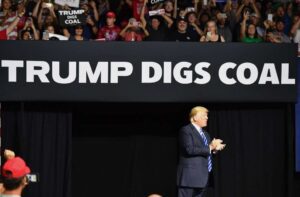United States president Donald Trump has lodged a formal request to withdraw the United States from the Paris Agreement, initiating a 12-month process that will see the world’s most powerful nation become the first country to back out of the landmark agreement on climate change.
Trump has long flagged his intention to pull the US out of Paris – it formed a prominent part of his campaign for the presidency, and comes as the Trump administration has ramped up its hostility towards policies introduced by state governments to control greenhouse gas emissions.
The decision to withdraw from the Paris Agreement has been widely slammed and is set to isolate the US even further. Trump’s administration also refused to commit previously agreed funds to the key Green Climate Fund. The only country following in its footsteps on that move was Australia.
“By withdrawing from the Paris Agreement, the Trump administration is showing that it cares neither about science nor economics. It is driven by outdated views from the last century that held that climate action was costly and hurt jobs,” CEO of the World Resources Institute Andrew Steer said.
“We now know that smart climate action, which is being carried forward through the Agreement, promotes greater economic efficiency, drives innovation, and provides long-term policy consistency. Combined, these lead to a much stronger economy.”
A country that ignores the threat to the very survival of this planet isn’t just troubled — it’s morally bankrupt.
We must get the climate change denier out of the White House and take urgent action to address the climate emergency.
— Joe Biden (@JoeBiden) November 4, 2019
Leading Democrat presidential contender Joe Biden went even further: “A country that ignores the threat to the very survival of this planet isn’t just troubles – it’s morally bankrupt.”
Trump formal notification of withdrawal with the UNFCCC secretariat commences a 12-month that would result in the US withdrawing from the Paris Agreement on November 4, 2020, the day after the 2020 presidential election. A future US president can recommit the US to the Paris Agreement with 30-days notice.
Environmental campaigners Friends of the Earth encouraged other countries not to follow Trump’s lead, and to remain committed to the Paris Agreement.
“Donald Trump is more concerned about protecting his golf courses than he is about climate change-fueled flooding that could threaten 300 million people living in coastal areas by 2050,” Friends of the Earth’s deputy director of economic policy Karen Orenstein said.
“World leaders must not wait for Trump, and must not use his moral bankruptcy as an excuse for inaction. The rest of the world must implement the Paris Agreement without the United States.”.
Since Trump’s election in 2016, he has sought to unwind all of the Obama era policies limiting greenhouse gas emissions, including Barack Obama’s flagship Clean Power Plan and appointing climate change sceptics to head the Environmental Protection Authority, and the Energy department.
Trump also cancelled the United States’ funding pledge to provide $2 billion to the Green Climate Fund, established to aid developing countries to grow and adapt their economies in a climate friendly manner. This was a move followed by the Australian government, which has refused to commit additional funds to the global fund.
Trump affirmed his intention to withdraw from the climate treaty in June 2017. It was a decision labelled as “disappointing” by then Australian prime minister Malcolm Turnbull, who said Australia “would prefer the United States to remain part of the agreement.
More recently, Trump has attacked state governments such as California that have stepped in to introduce policies reduce emissions in the absence of federal policy, and threatened to challenge the constitutionality of state policies.
When negotiated in 2016, the Paris Agreement represented a landmark moment in international co-operation to limit global warming. Central to the agreement is a goal to limit global warming to no more than 2°C above pre-industrial levels, with an aspiration of limiting warming to no more than 1.5°C.
While all countries have subsequently become signatories to the agreement, they have yet to ramp up their commitment to match the overall goal.
The Climate Action Tracker initiative currently predicts that the world is on track for more than 3 degrees of warming based on current government policies, and over the next year the UNFCCC will ask all countries to adjust their individual commitment to narrow that gap.
Climate change negotiators will meet in the city of Madrid in Spain in early December for the 25th round of annual UN climate talks. Chile was originally selected to host the talks, but the Chilean government was forced to withdraw as hosts following weeks of mass anti-government protests.








